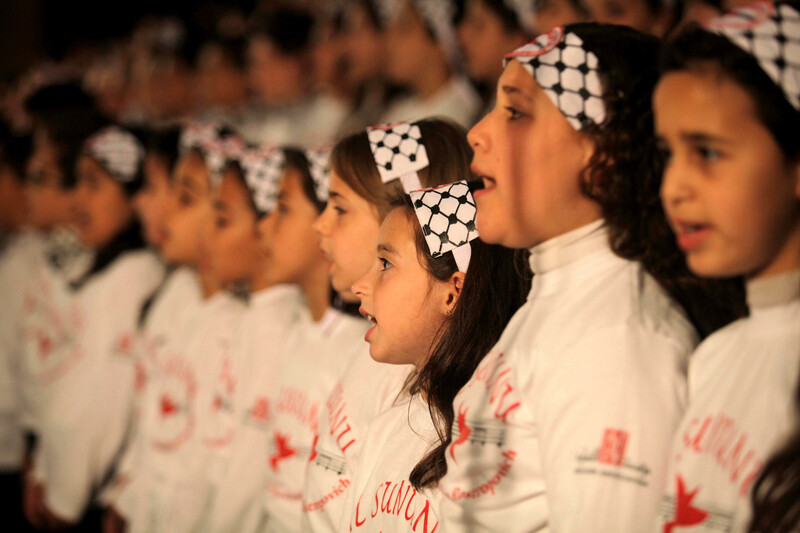The Electronic Intifada Gaza City 26 April 2013

Hundreds of children participated in the multi-city concert.
APA imagesThe largest hall in Gaza City’s plush al-Mashtal hotel felt almost as packed as the cinderblock alleys of the nearby al-Shati (Beach) refugee camp on Tuesday.
A choir of hundreds of refugee children, from the camp and elsewhere in the Gaza Strip, had assembled, along with a much larger audience.
Connected by satellite to similar gatherings across Palestine and its Middle Eastern diaspora — Bethlehem, Amman, Beirut and Damascus — the event brought the voices of refugee children separated by walls and borders together in a unique concert.
“It was about unity: all Palestinians, everywhere, coming together,” said Mais Salfiti, a volunteer who welcomed observers outside the hall.
Salfiti, an interior designer and recent graduate in architecture from the Islamic University of Gaza, is a children’s Sunday school teacher and youth worker at Gaza City’s Greek Orthodox Church of Saint Porphyrius, which joined many other local organizations for the event.
“We have a kid’s choir,” she said of her church’s role. “Thirty-five of them participated in the event,” out of approximately 300 in the Gaza choir and the total of more than 700 across the five locations.
“Our other participation was through the volunteers. Six of our youth worked today.”
“Unite them all”
The event drew broadly from the Gaza Strip’s refugees, Salfiti said. “We had choirs from the church and different schools: government, UN and special ones like the American school. We had volunteers from the schools, the church and political associations.”
It was coordinated by the al-Sununu Children’s Choirs, a project launched by the Association Elena Rostropovich that “aims to give access to basic music education to refugee children and unite them via traditional music,” according to the concert program.
It also drew support from regional musical institutions: the Edward Said National Conservatory of Music, the Lebanese National Higher Conservatory of Music, the Solhi Al-Wadi Institute of Music in Syria and the National Music Conservatory in Jordan.
Displacement
The Gaza Strip has the highest proportion of refugees of any territory in the world. By the end of 2012, the UN Agency for Palestine refugees, UNRWA, had registered more than 1.2 million refugees in the besieged enclave, out of a total population of approximately 1.6 million.
UNRWA registrants, like Salfiti’s family, were forced from their homes in present-day Israel by Zionist militias or Israeli military forces in 1948. The agency’s mandate restricts its services to those “who lost both their homes and means of livelihood” in the expulsion — known to Palestinians as the Nakba (catastrophe).
According to the Palestinian refugee advocacy group Badil, 7.4 million Palestinians had been forcibly displaced by Israel, compared to UNRWA’s registry of 4.8 million. Only 34.2 percent of a worldwide Palestinian population of 11.2 million had never been displaced (“Survey of Palestinian refugees and internally displaced persons 2010-2012,” Badil, November 2012 [PDF].)
“Beautiful”
“I know that we have to go back to our homes,” Salfiti said after the concert, whose location, by the northern coast of Gaza City, lay within eyesight of many refugees’ villages in Ashkelon and Ashdod (both in present-day Israel).
“It was beautiful,” she said of the day’s music. “They chose the songs well.”
Each of the five choirs first sang individually. Their performances were broadcast to the other four, projected onto screens and sounded through speakers. Selections ranged from “Thob Sitti” (“My Grandmother’s Dress”), written by Gaza’s Khaled Juma and sung from the ceremony hall in Sahnaya, Damascus, to Marcel Khalife’s “Asfour” (“Sparrow”), performed in Bethlehem’s Dar al-Nadwa theater.
Finally the three choirs sang together, their joint performance culminating in the Palestinian folk song “Wayn a Ramallah.”
“It was fun,” Maryam, a 10-year-old singer from the Jabaliya refugee camp north of Gaza, said after the concert. “It felt like we were all together.”
“I liked how the kids sang in the same voice, the same song,” Salfiti said. “Unlike our politicians.”
Joe Catron is a US activist in Gaza, Palestine. He co-edited The Prisoners’ Diaries: Palestinian Voices from the Israeli Gulag, an anthology of accounts by detainees freed in the 2011 prisoner exchange, blogs at http://joecatron.wordpress.com and can be followed on Twitter @jncatron.



